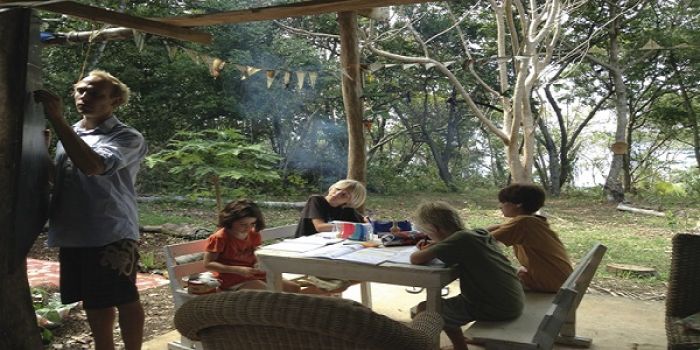A family gap year on Tonga Featured
 Kian home schooling the kids. Image: Susie Moss
Kian home schooling the kids. Image: Susie Moss
A family gap year on Tonga
By Susie Moss
Are you brave enough to take your children out of school for a year to live on an island in Tonga? One mum explains why she took a family gap year and discovers the trials and triumphs of living, learning and working thousands of miles from home
Their sudden presence comes as a shock. One minute, we’re clumsy little beings, flailing around trying to find needles in a vast watery haystack; the next, there they are: humpback wales, magnificently enormous, and all around us. They swim below us and beside us, and dance balletically before our eyes; great bodies turning gracefully on long, wing-like fins.
Watching them, you inevitably find yourself trying to emulate their movements — so we float, arms hanging out, suspended in the big blue.
“Wow,” splutter both Marlon (10) and Maisie (7) as we surface. We’re all momentarily lost for words until — “Did you see it poo?!” gasps Maisie. It was, in so many ways, an unforgettable experience for us to share.
Tonga is one of the few places in the world where you can swim with humpback whales in the wild. These immense creatures come to the South Pacific’s warm waters to mate and calf before returning to the cooler, krill-filled Antarctic.
As well as being a transient home to whales, the Kingdom of Tonga has 36 inhabited islands out of a total of 176. Just 12 islands have cars on them and only seven have mains electricity. There’s neither on Fofoa, a tiny speck — less than one sq km — set in the northern archipelago of Vava’u, where a basic tented camp in the jungle has become our family home.
We’ve just four neighbours, including our friends who’ve lived here for around eight years, raising three boys, aged eight to 13. They’ve built their home in this harsh paradise: a coconut-wood log cabin which sits alongside their business, The Beach House — a spectacular, coral-rock, beachfront guesthouse. I’m here to work as a chef, while my new partner, Kian, helps to maintain the boats and buildings — an ongoing task in this salty environment.
I’d always wanted to visit these remote islands, but being so far away, a quick holiday was not an option. A family gap year abroad, taking the kids out of school and fully immersing ourselves in a different lifestyle seemed like a dream solution.
Having been a single parent until recently, it wasn’t easy to work and save for such a big trip, so I took the leap of renting out our small Devon home and living cheaply in a caravan in the garden. That year not only enabled us to save money, but also prepared us in other ways: learning to live together in a more simple way, we grew our sense of adventure and capability.
Despite a happy life in Devon — a job I loved, a good community of friends and family — I felt disillusioned and longed for something different. I wanted to escape the monotonous grey, small town life and the everyday routine, including the school run.
I was dissatisfied with the way the kids were growing up, the curriculum-learning pressure and the excessive, anxious parenting, where every part of a child’s day is neatly planned and portioned.
I wanted them to see that the world is so much bigger, to see how others live and to challenge ourselves. I wanted a life closer to nature with more freedom and fewer rules.
Island time
Days at our ‘jungle camp’ start early as hot sunshine streams through the tent. Maisie announces which of the island’s resident cats have stayed the night, and Marlon chases one to release the lizard clamped in its mouth.
Kian lights a smoky fire to ward off the persistent mosquitoes and I cook up our usual porridge — an unlikely breakfast on a tropical island but the simplest and most easily available cereal in a land where everything other than fruits and roots is imported. If we’re lucky, it’s topped with papaya, pineapple or mango from the plantation around us.
The ‘school run’ involves either clearing the table or a short walk through the jungle, depending on whose turn it is to teach. We’re three untrained adults sharing the education of five kids. And I’m quickly discovering it’s hard to teach your own kids — they don’t see me as a teacher… yet. We’ve divided the key subjects between us, according to interest and ability.
Kian gives a visual description of how the Earth moves around the Sun with an old buoy and our blow-up ‘Earth’ beach ball. We run school in the mornings from 9am to noon-ish before a break for lunch, and then try and have a quiet hour in the afternoon for extra reading or handwriting practice.
It doesn’t always go to plan: a fortnightly trip to town — a one-and-a-half-hour boat trip — may be needed for supplies, we may need to cater for guests, or there may be a more exciting diversion, such as a local village feast or an impromptu whale swimming trip.
Generally, as soon as school’s over, the kids disappear, free to roam and play until suppertime. It’s such a privilege to be in a place with no roads to worry about, no dangerous mammals — human or otherwise — and no strong waves and currents. They can explore the entire island and they love this wilder life. We spend long afternoons in the ocean playground: in it and on it, swimming, snorkelling, diving, or messing around in boats.
From each snorkel trip, the kids return with tales of the weird and wonderful critters they’ve seen — the elegant stingray, comical pipefish, synchronised squid. There are turtles and reef sharks to be found and an uninhabited island to be explored.
The world here is vivid and exciting, there’s no need to view it through a screen. The kids are thoroughly absorbed and the absence of battles over screen time is a welcome relief. There’s no TV (of course), limited internet, and we chose not to bring any gaming devices with us. And, while I’m not naive enough to think that when we return to a place of speedy broadband and screen-based entertainment the kids (or I) will be able to resist it, it’s lovely how our life has developed here.
In the evenings, huge bats swoop silently overhead and the cicadas start up in waves of manic noise. Sometimes, we sit around the fire and play card games under the strikingly bright stars, or read stories until the solar light fades. This is quality family time like we’ve never had before and I love it.
Of course, nothing can be idyllic all the time — there are times when the kids miss their dad and bouts of homesickness, too. The basic necessities of living here mean some pretty hard work: living in tents, rationing water, and being creative with a limited food supply. But there are no external pressures of jobs and bills, and it surprises me that the hardest thing we face is often ourselves.
Sometimes, amid the intense heat and humidity, it’s hard to stay rational, and on this tiny island with so few people and social distractions, we have a lot of time to look inwards — and it’s not always comfortable viewing.
It’s a pretty intense test of a relatively new relationship, but also a rare chance to become a closer family unit, to learn more about ourselves and re-evaluate our future. And I have no regrets.
This is creating lasting memories for Marlon and Maisie and gives them a taste of a life that may have a positive impact on their future life choices. We don’t know where we’ll be this time next year, but I’d rather be here wondering, than dreaming somewhere else.
-National Geographic Traveller
1 comment
-

Thank you for sharing your beautiful story. Congratulations for taking a huge leap of faith and I do envy the freedom you enjoy there. I commend you for the way you teach the kids, what better way than to have nature as your guide. The curriculum in NZ value aim for the experiences your kids are lucky to live and breathe. Keep up the awesome work and treasure the memories.



